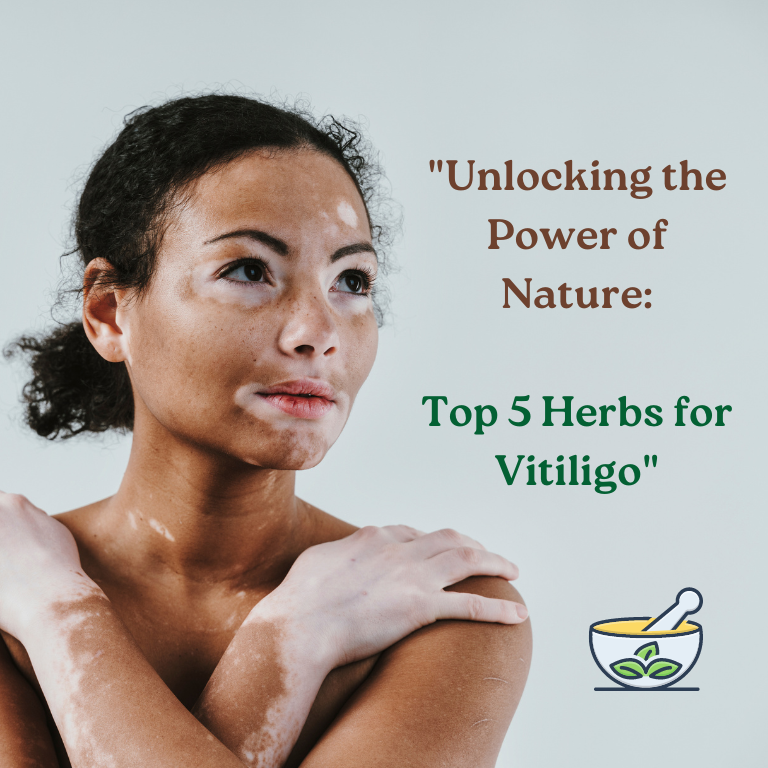
“Unlocking the Power of Nature: Top 5 Herbs for Vitiligo”
“Unlocking the Power of Nature: Top 5 Herbs for Vitiligo”
Vitiligo is a skin condition that causes loss of pigmentation, resulting in white or light patches on the skin. It occurs when melanocytes, the cells that produce pigment in the skin, are destroyed or stop functioning. The exact cause of vitiligo is not fully understood, but it is believed to be an autoimmune disorder in which the body’s immune system mistakenly attacks and destroys the melanocytes.
Vitiligo can affect any area of the skin, but it is more commonly found on the face, neck, hands, and arms. The patches can be small or large, and their shape can vary. The edges of the affected skin may be smooth or irregular, and the affected skin may be more prone to sunburns.
Vitiligo can affect people of all ages, races, and genders, but it is more noticeable in people with darker skin. The condition is not contagious or life-threatening, but it can have a significant impact on a person’s self-esteem and quality of life – read the blog in detail here.
Nature can provide many different remedies and treatments that may help with the symptoms of vitiligo. Many people with vitiligo turn to natural remedies, such as herbs, to help manage the condition and improve the appearance of their skin.
Several herbs are believed to be beneficial for people with vitiligo, a condition characterized by patches of depigmented skin.
Here are five herbs that are commonly used to treat vitiligo:
1: Psoralea corylifolia (Babchi)

This herb is believed to have properties that can help restore pigmentation in the skin. Psoralea corylifolia, also known as Babchi, is an herb commonly used in traditional medicine to treat various skin conditions, including vitiligo. Babchi is believed to have properties that can help restore pigmentation in the skin. Some people use Babchi as a topical oil or ointment and apply it directly to the affected areas of the skin.
2: Ginkgo biloba

This herb has antioxidant and anti-inflammatory properties that may help improve the appearance of vitiligo.
Ginkgo biloba is an herbal extract derived from the leaves of the Ginkgo biloba tree. It is commonly used for its potential benefits for memory and cognitive function. While there is limited research on the use of Ginkgo biloba for vitiligo, but in natural medicine, it is believed that it benefits Vitiligo.
The exact mechanisms by which Ginkgo biloba might help with vitiligo have yet to be well understood, but it is believed that it may improve circulation, increase oxygenation to the skin, and improve immune system function.
3: Turmeric (Curcuma longa)

Turmeric has anti-inflammatory and antioxidant properties that may help improve the appearance of vitiligo.
It has been used for its medicinal properties in traditional medicine for centuries. Some proponents of alternative medicine believe that turmeric may have benefits for vitiligo, a skin condition that causes loss of pigmentation.
Turmeric has anti-inflammatory and antioxidant effects, which could help improve the skin’s health and reduce the risk of developing vitiligo. Additionally, turmeric may benefit skin health by helping to regulate the production of melanin, a pigment that gives color to the skin.
4: Goosefoot (Chenopodium album)

This herb is believed to have properties that can help restore pigmentation in the skin.
Goosefoot, also known as Chenopodium album, is a plant species commonly used in traditional medicine to treat various health conditions, including skin problems.
Goosefoot may have benefits for vitiligo, a skin condition that causes loss of pigmentation.
Goosefoot might help with vitiligo coz of its anti-inflammatory and antioxidant effects, which could help improve the skin’s health and reduce the risk of developing vitiligo. Additionally, Goosefoot may benefit skin health by helping to regulate the production of melanin, a pigment that gives color to the skin.
5: Licorice (Glycyrrhiza glabra)

Licorice has anti-inflammatory and antioxidant properties that may help improve the appearance of vitiligo. The biologically active compound of licorice is being used as a plant-based medicine for many diseased conditions due to its
neuroprotective, anti-inflammatory, antiviral, and anti-carcinogenic properties.
It’s essential to keep in mind that these herbs should be used with caution and under the supervision of a healthcare professional. Some herbs may interact with medications or have other side effects, and their effectiveness in treating vitiligo has not been scientifically proven.
“Don’t lose hope if you’re struggling with vitiligo. A holistic approach to treatment can make a big difference, and I’m excited to share that I’ve created a natural skin program specifically designed to help. Book now and take the first step towards natural healing and a brighter future for your skin.”
